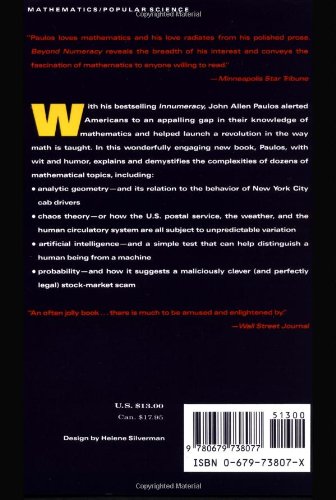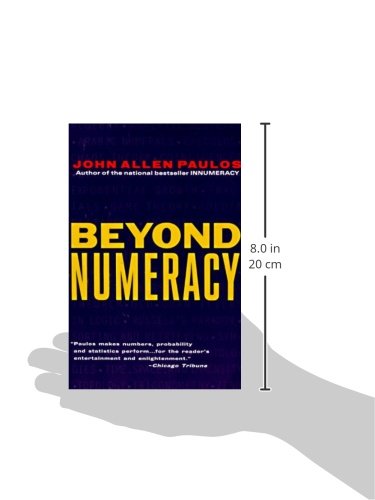Deliver to DESERTCART.COM.PY
IFor best experience Get the App




Full description not available
D**V
GREAT INTRO REFERENCE TO SIMPLE AND COMPLEX MATH
This is almost a sequel to Innumeracy in which Paulos goes beyond the simple exposition of people's difficulties with math to teach, in a very readable fashion, to main concepts of mathematics, be it simple high school, college, or even the complex research mathematics.The nice thing about this book is that you can read it bit by bit, since each chapter that deals with a topic is about 3-5 pages long, so you won't get bored and if you don't understand one topic you can move on to the next one. The topics are not really connected, so one can just move on to somehting one finds more interesting.Overall, I believe I now know what many of the complex topics like chaos theory are about. Enough for a cocktail conversation with a mathematician at least.
J**N
Perfect. Exactly as expected
Perfect. Exactly as expected.
P**P
easy read and to the point
Nothing in depth but a concise and usually entertaining description of a large number of math topics.
R**S
Five Stars
JAP is a god among men - read everything you can of his,
N**L
Five Stars
Only someone who has the math understanding that J. A. Paulos posses could write such an illuminating book.
C**Y
Fairly Interesting
Pretty good book. It gives a good overview of the major concepts of mathematics and it helped me to understand more the historical oontext of those concepts.
C**I
One Star
purchased the wrong book.
A**A
Encyclopedic knowledge on mathematical topics
The book consists of short articles on key mathematical topics. The best articles are the ones really focused on mathematical or geometrical topics, especially the ones where he went down to the explanation or demonstration. Other topics like Goedel's theorem are more difficult and although one can try to understand the very broad idea behind, I could not say I have even come close to an understanding.The articles about the philosophical detours of a mathematician were also difficult to follow. I have the impression (just a metaphor) that when we perceive a formula or mathematical or logical proposition, our brain circuitry recognizes it as such and the signals travel through a special mathematical processor that is difficult to access in regular circumstances. This would explain our fear of formulas and other logical constructions, since these neurological pathways are not the common route. Mathematicians seem to use this path as the standard route, so they talk about everyday situations in mathematical terms leaving us lay persons wondering: "What is he talking about?" So when for example a person explains a traffic light in terms of an algorithm, you know you are talking to a mathematician.His mathematical account of the perfect democracy offered me new insights of which I had not thought of and I believe the implications of these are very important.Since each article has no relation with the next, it is not a book that you cannot drop, you can read one chapter every now and then. The author chose an alphabetical order for his articles rather than a chronological one. This makes you jump from Aristotle and Euclid to Goedel's theorem, over Pascal's triangle and back to Pi and Pitagoras. In the end I appreciated this approach, since I did not have the impression that the more I read, the more incomprehensible or difficult it would get, I was rather glad that I could return to known terrain like Pitagoras.All in all this is a highly recommendable book, I just would have liked some topics explained in a little more detail.
Trustpilot
1 week ago
5 days ago